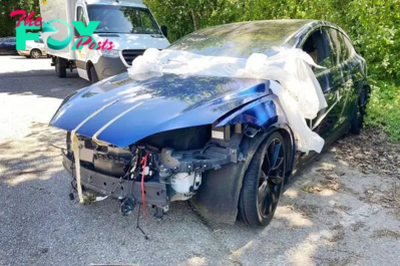Technology
Adelaide man Carlo Onorato paralysed from rare neurological condition
Carlo Onorato could never have predicted or prevented a health condition that would leave him paralysed from the waist down, he said.
But ultimately, it taught him he is capable of facing anything life will throw at him, including re-defining his career now that he is in a wheelchair.
“I’m very proud of myself ... it wasn’t easy, I didn’t think I was capable of doing it, but I got through it,” Onorato, who was formerly a barber in Adelaide, said.
Watch the latest news and stream for free on 7plus >>
“I don’t want my story to be of tragedy. I want it to remind people that your life can literally change in the blink of an eye and to encourage people to live life, enjoy every moment and appreciate the little things”
Onorato went to sleep one night five years ago. When he woke up, he found himself unable to walk and suffering severe neck pain.
In hospital, his condition worsened. He developed duodenal ulcers, a burst abscess and a perforated bowel.
“They discovered I couldn’t breathe on my own. My lungs were failing me, so they put me into an induced coma,” he said.
“My stomach was essentially filling up with a whole lot of bile and other stuff.”
Doctors later told Onorato he had a rare neurological condition known as transverse myelitis that causes iNFLammation in the spine and subsequent damage to surrounding nerves.
But they couldn’t explain why or how the condition developed, and for a long time, Onorato was unable to accept that he would likely never walk again.
“It didn’t really hit me for a long time. When I was in hospital, I was under the assumption it was a short-term thing. It didn’t really click in my brain that this was my life,“ he said.
Onorato spent about three months in the hospital and had multiple surgeries, including nerve and tendon transplants, to strengthen his arms and hands.
His family, at one point, were told to say their goodbyes because there was a real possibility he might not survive one of the procedures.
“It was really hard for them to watch,” he said.
After weeks of being bedridden and strapped to machines, Onorato relearned how to talk, then “relearned how to chew, how to swallow and progressed from fake feed to liquid feed to blended foods and then slowly smaller solids”.
Even now, he continues to live in pain and struggles with fatigue and disrupted sleep, so he never feels properly rested.
But coming to accept and even celebrate where he is now was the biggest battle, he said.
“I didn’t want to do anything. I didn’t want to talk to anyone,” Onorato said of the months after he was discharged.
“Eventually, I sort of got it in my head I need to get out of this hole. I got back into the gym, which was massive for me, getting out (and) doing a bit of socialising.”
The 25-year-old has just re-learned how to drive and hopes to soon return to work once he has found how to turn his passion for sneakers and fashion into a career.
He shared his story with hopes of raising funds for spinal cord injury research through the South Australian Health and Medical Research Institute (SAHMRI).
“When you know there’s research going on, it gives you hope. You want to fight, you don’t want to give up,” he said.
“It’s so important to have that hope because I’ve seen what happens to people when they lose it.”
SAHMRI’s Neil Sachse Centre for Spinal Cord Injury Research has a number of ongoing trials aimed at determining the cause of some conditions like transverse myelitis and potential treatments.
Donations can be made via the Centre’s website.
-

 Technology48m ago
Technology48m agoNew algorithm slashes time to run most sophisticated climate models by 10-fold
-

 Technology48m ago
Technology48m agoFollow Live Science on social media
-

 Technology7h ago
Technology7h agoTiny, transparent chip could transform your smartphone into a professional-grade camera
-

 Technology7h ago
Technology7h agoAre electric vehicles safer than gas-powered cars? Maybe for the passengers—but not for everyone else.
-

 Technology22h ago
Technology22h agoGerman company launches candle wax-powered rocket on test flight into space
-

 Technology22h ago
Technology22h agoOrangutan's use of medicinal plant to treat wound intrigues scientists
-

 Technology1d ago
Technology1d agoAnimal behavior research is getting better at keeping observer bias from sneaking in – but there’s still room to improve
-

 Technology1d ago
Technology1d agoA look inside the cyberwar between Israel and Hamas reveals the civilian toll



























